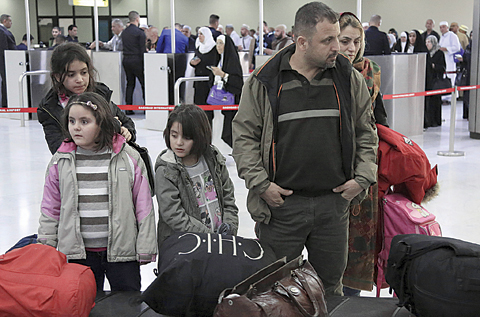 BAGHDAD: An Iraqi family returning from Europe waits for their luggage at Baghdad International Airport yesterday. —AP
BAGHDAD: An Iraqi family returning from Europe waits for their luggage at Baghdad International Airport yesterday. —APBAGHDAD: An Iraqi government spokesman says dozens of Iraqis who sought refuge in Europe have returned to the country. The Foreign Affairs Ministry spokesman, Ahmed Jamal, says 103 migrants returned home yesterday amid emotional scenes at the Baghdad International Airport, where some of the returnees were kneeling and kissing the ground. Many were seen holding "yellow passports" - documents given by Iraqi embassies to those wishing to return home.
Since last year, many Iraqis have joined the tide of migrants trying to reach Europe and fleeing war and poverty across Africa, the Middle East and South Asia.
Jamal says yesterday's returnees all came from Finland and that more groups are to follow. He didn't elaborate. Turkey and Greece are is the main gateways for migrants fleeing to Europe.
The Iraqi government has decided to cut the number of state-financed paramilitary forces due to a shortage of funds as the international oil price declines, a spokesman for a leading militia group said yesterday.
Karim al-Nouri, the spokesman for the Popular Mobilization Forces, an umbrella group made up predominantly of Shiite militias, told The Associated Press that around 30 per cent of paramilitary troops were expected to be laid off. Some 130,000 fighters in Iraq are affiliated with pro-government paramilitary forces.
Al-Nouri added that the decision would not affect the fight against Islamic State group, which controls areas in northern and western Iraq. He said the cuts will also cover non-combat troops providing administrative and logistical support. He did not give details on the how many combat troops will be laid off.
In mid-2014, several Shiite militias along with volunteers joined the fight against IS after large divisions of Iraq's military fled rapidly in the face of the militant group's advance. A number of Sunni tribes later joined the fight. It is unlikely the cuts to paramilitary funding will lead to frontline defeats as Iraq's army is receiving support from the US-led coalition against IS. Iraq's oil-reliant economy has been severely hit by falling crude prices, and the war on terror is proving costly for the cash-strapped government. Iraq has the world's fourth largest oil reserves and oil revenues make up nearly 95 percent of its budget. The government introduced a series of austerity measures in 2015, merging several ministries and cutting government posts, halting spending on infrastructure projects and raising taxes. -AP










